#module oc
Explore tagged Tumblr posts
Text
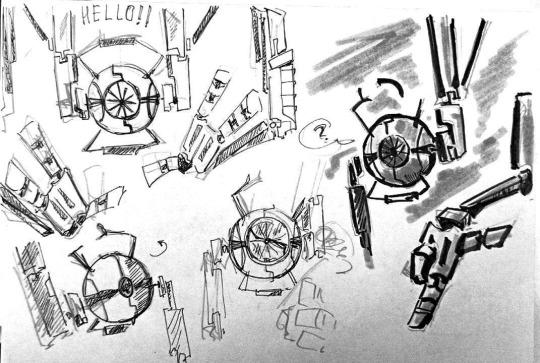
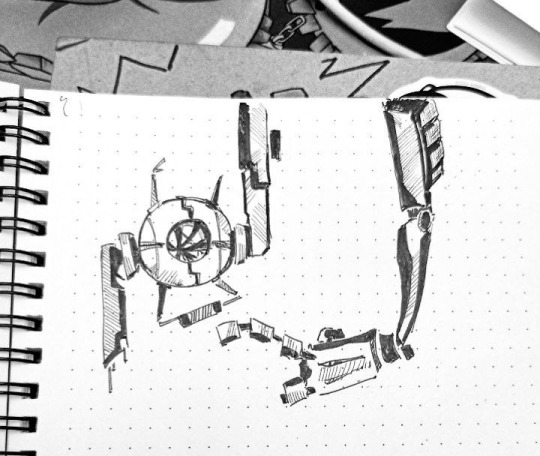
What do you think about OC?
Hiiiiiiiiiiiiiiii
I want to show you a module that just recently appeared in my thoughts!! - Сluster. (゜▽゜*) The Combination Module. It is currently not in the best condition due to being located in a long-abandoned laboratory complex in one of the alternate universes of the world. By order of the company, there should have been about a hundred of them - these modules performed work from the simplest to the most complex and dangerous for human intervention. They included 5 different modes or personalities, which manifested themselves depending on the type of work :drag the load, simulate, conduct an experiment, etc.
The Cluster.5 is the main one in the module's system, which in most cases controls all processes, however, the other 4 "personalities" often try to break into the foreground. (Green, White, Red, Yellow, Purple)
Previously, he had two "hands", can store a large amount of information, and previously worked in archives. Here!!


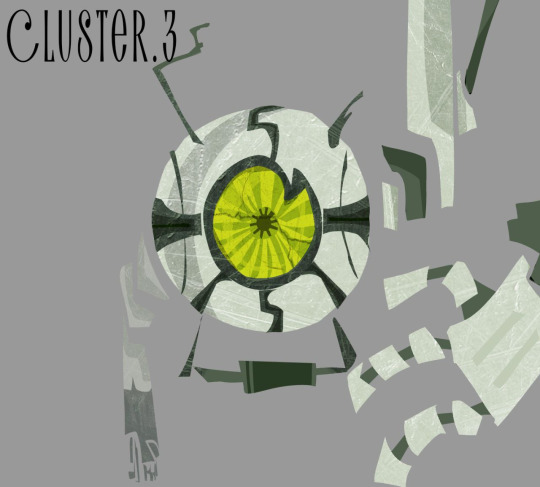


22 notes
·
View notes
Text

I made a character sheet to plot your OC's development over time! (There's supposed to be a character name in the big white space next to "over time" but it got eaten a little lmao)
You can use this for whatever you want, and you don't have to credit me. Feel free to change or edit anything you feel like. Please don't tag me if you credit me - just link to the original post.
Credits, explanations & a transparent version under the cut :D
Credits:
The actual image was made with the free NBOS character sheet creator, which is a sort of dated but free and solid text-layout sheet maker intended for ttrpg style character sheet creation.
Fonts used were Bisdak (titles) and Rockwell (body). Both are free! You can use them to fill it out if you like.
Inspired by a comment @maybe-solar-powered-calculator made on this other post about filling it out for characters at multiple points along their arcs. Thanks for putting the idea in my head :D
This is explicitly released under a CC0 1.0 deed, ie: you can do fucking whatever you want with it and I don't care and you don't have to tell anyone where you got it from and no one gets to stop you.
-
Last time I made one of these I got a bunch of questions on all manner of things, and I can never keep up, so I'm just appending a set of notes for how to use it and a glossary because I know some of these phrasings will be confusing.
Ignore or change anything you don't feel like works for you here. You can do whatever you want forever.
Suggested / intended use & general notes:
This sheet could work for something story-level, if you want. But it's really only good for individual arcs; if the character goes through multiple arcs in your story, then they're going to fit poorly here. In that case, you're probably better off doing versions for each arc, or just adapting this to a different format more suited to your thing.
Also, if your arc has a nontraditional structure - divorced from the typical "rising action - climax - conclusion" type of structure where there's a clear 'important turning point' - it may not work as well either.
The mindset section is meant to come at it from a 'golden mean' standpoint - that is, everything on either extreme of the slider is 'too much' and therefore bad. It's not bad-to-good! The far right side is a flaw too. They're only grouped the way they are on basis of the specific OCs I personally had in mind when I put it together.
Growth is labeled 'worse'-to-'better' but it means, like, active decrease in that area vs active increase; if nothing changes, it should stay at the center even if it sucks. The category is about contrasting changes, and sometimes changes are for the worse!
The entire sheet is very deliberately subjective. It should really be answered from the character's perspective - how they feel about it, not what's necessarily true. Technically you can do whatever you want and I can't stop you, but it's a better tool if you approach it from the point of view that the character may believe things that aren't true - that will define their behavior way more than the objective facts of the story.
-
Definitions:
This part is long as hell - recommend using ctrl+f to find the specific words you're stuck on. I defined everything.
General categories:
Mindset: how your character thinks about themself and how they act. Their understanding of their own approach to life. Attitude, viewpoint, decision-making process, that sort of thing.
Circumstances: the relationship between your character and the world around them. Where they are, what that place is like, and how they feel about it.
Growth: how the character and their impact - their attitude, their behavior, their immediate surroundings - changes over time.
Outset: the start of the character's arc.
Present: the 'center' of the arc. If you're planning something ahead of time and it hasn't 'happened' yet, then this is the near future.
End-game: where they are after the conclusion of the arc.
Mindset terms:
Center of the world: "If I have a problem, it's the only thing that matters to me." Self-centered, self-absorbed. Doesn't necessarily mean anything beyond that - they don't necessarily have to be unpleasant to be entirely focused on their own life.
my life isn't relevant: "Everyone else's problems are so significant, I don't pay any attention to my own". Someone who ignores or neglects their own life in service of some other thing, or doesn't consider their own behavior to have any real importance.
Only see enemies: Paranoid. Everyone's out to get them. Anyone who seems nonthreatening is hiding their potential for danger and everyone who seems threatening is a threat. The character must remain ever-vigilant, lest the cashier at the 7/11 suddenly stab them, or their best friend turn out to secretly be trying to poison them to death.
Only see friends: Naïve. Everyone is a good actor who wishes everyone else well, and if they don't seem like they're acting from a place of kindness or care then you probably don't understand what they're up to. The character is pretty sure the stranger holding that knife is, like, someone to chat up maybe, they're clearly only hanging out in this dark alleyway because it's a nice spot and no other possible reason.
overthink everything: Ten thousand thoughts per every single action taken. Maybe they never get around to acting at all. They have to consider every possible outcome. What if by eating lunch they accidentally trigger the apocalypse?! Who's going to think about these things if not them?!?!?!
impulsive to action: Act first, think never. What do you mean "consequences of actions"?
Unilateral decisions: "I will make every choice and no one else's opinions or thoughts are relevant". Discounts outside suggestions. Firmly convinced that they know best in any situation, and will brook no disagreement with their views when it comes to actually doing things.
Command me, please: "I don't know what to do and I don't know what to even start with, someone please tell me what to think". No confidence in their own views. Will not make any decisions unless forced and even then will beg someone else to please tell them what to do. Has no idea what's best and is pretty sure anyone else will have a better idea.
can't ask for help: No one will ever help the character; they have to do everything themself, even the things other people have repeatedly offered to do for them and have much more experience with. Doesn't necessarily mean that no one will help them or that they are explicitly barred by some real-world circumstance; just that, for whatever reason, they refuse to ask for help. This is an attitude thing - will they ever reach out? No? Then they're here.
too reliant on others: Have they ever solved a problem alone? Do they believe they're even capable of doing so? The character all the way at this end of the scale absolutely never expects to be able to do anything themself, has no trust in their ability to solve a problem, and needs someone else to come save them from it. The kind of person who needs ChatGPT to do their homework. Again - doesn't actually mean anyone will help them, or that the people they're relying on are reliable - just that they think they are helpless without ... well, help.
Weapon maker: This has to do with problem-solving strategies and not actual weapons. The weapon-maker is a character who views every situation as a conflict that cannot be de-escalated or solved by cooperation, and responds appropriately. The most fundamental weapon maker character turns everything into an argument, a fight, a war, etc. There are a bunch of other responses to conflict, though - they might avoid problems that need solving because they avoid conflict generally too. Fundamentally what you want to answer here is: when they see a locked box and they don't have the key, do they respond to it the same way they'd respond to someone telling them "you can't open this box"? And how do they respond to that? Typical weapon-maker approaches: - brute-force the box open or try and then give up if it doesn't work; and also get into an argument that might turn physical with the hypothetical person - shrug and give up immediately, in both situations so on and so forth. Another hallmark is that they kind of suck at problem-solving and give up if brute-forcing a problem doesn't work. This is not someone who is picking locks unless someone else told them to - they have one solution, it's to make everything into a conflict, and then to win that conflict by beating them or to give up because they think they'll lose.
Tool maker: This person approaches every situation like it's a puzzle, not a fight - up to and including actual fights. Tool-maker characters generally assume that a situation can be solved by just finding the right approach and doing it the clever way. There's the same fundamental question as above - if your character sees a locked box and has no key, would they approach it differently than someone telling them they're not allowed to open the box? 'Typical' tool-maker approaches: - I can trick the person into giving me the key by saying the right things, and I can also pick the lock because fundamentally there are 'right answers' to both of these - If i make friends with this person, they might change their mind, because now we're cooperating. I can still pick the lock because there are 'right answers' there. - The person has a reason for wanting me not to open the box, so I can definitely figure out what that is and solve the reason so then they'll let me open it. I can take whatever it is even if they really want to keep it if I just find the right answer. I'm going to break this box into little pieces because that's the easiest way to get into it but I could probably open it some other way if that wouldn't work.
A note - the center of this bar is someone who generally has different responses to different kinds of situations - like, in the box example, they'd approach the box and the person with two different general attitudes and processes - but generally responds to those situations using the same kind of decision-making process for each category every time. Most people are nowhere near either extreme. Characters tend to be classifiable into weapon-maker and tool-maker because they are fictional and it's easier to define one kind of approach than many. Approximately average approaches: - pick the lock if no one's around, but give up if someone is there because someone telling me not to open the box is a conflict i think i'll lose but a locked box is just a puzzle that i can solve - argue with the person, but give up on the box, because they're approaching the box as a puzzle and they don't think they have the skill to get into it, but the person is someone who can be convinced or bullied into handing over the key
I made this particular dichotomy up, which is why I think I get a lot of questions on it whenever I put it into anything, but I also don't know of any other snappy way to describe this sort of thought or approach variance, and it's genuinely useful for character writing in my opinion.
Pessimist spot-finder: Generally a downer but not necessarily. This kind of character just approaches everything with a close eye for problems, issues, reasons to find fault. If they're miserable, it might be why, but like, they can be a cheerful spot-finder if you want, I just wanted to get at "the glass is half empty" and "the glass is half full" more than anything.
Optimist upside fan: The opposite. "The glass is half full". If there are problems, they can find something about them that's not so frustrating or bad to focus on. Pretty damn good at overlooking minor issues if there's no reason to fixate on them. Not necessarily cheerful.
Abysmal company: could not give less of a damn about treating people the way they 'should' be treated. Maybe they take pride in that. Maybe they just think it's irrelevant. Either way, they know they treat people badly and they don't see any reason to stop. Does not necessarily mean that they treat people badly if they think they're doing the right thing and are wrong. Doesn't mean they're actually pleasant or unpleasant to hang out with, either, unless you really want it to mean that.
Decent to others: treats people well as a matter of course, or at least they sure think they do. Makes an effort. Would probably care and/or consider changing their behavior if someone said they were treating someone poorly. As before - they can be completely un-self-aware and just think they're doing right by people while treating them completely horribly.
Morality is irrelevant: 'abysmal company' for broader approaches to life and problems. Maybe they just know they're myopic and don't think other people's problems matter. Maybe they just gave up on trying to differentiate between 'good' and 'bad' and outsourced it to someone else or stopped paying any attention. Maybe they just like to take morally unjust actions and can't be bothered giving a damn when someone points out that they're morally unjust, or maybe they're proud of it. Kind of a villain trait generally, but not necessarily - it doesn't have to mean they act badly, just that they don't care if they do. Also, this is about how they choose their own actions and view their own behavior. They can think morality is relevant for other people as long as they ignore it when they act themself.
Always in the right: feels morally righteous in every decision they make. Standard superhero type of trait. Doesn't necessarily pass judgement on others, doesn't necessarily act well according to everyone's moral code (see: blue and orange morality), but they are extremely principled and will never deviate from the moral code they personally believe in. And they do genuinely believe in it.
Circumstances terms:
Generally terrible to generally excellent: how subjectively decent is your character's situation, overall? If they think everything is horrible, but the situation is charmed to everyone except them, then it's generally terrible.
Need for changes to passive tolerance: will they do something about it? Do they feel like they have to?
No agency in action to decisions are huge: agency being "how much power do I have to make changes here?", this just asks how much they have. No agency means that, no matter what they do, nothing will happen - they might be locked in a cage or somehow otherwise completely unable to use any sort of power at all, even the power of just leaving. The other end of the spectrum is where every decision the character makes makes a huge difference, not just to themself but to everyone around them as well. They can start wars, they can have anyone they want killed, they can do anything whenever they feel like it. If they think they have no agency even though they do actually have agency, they don't have agency here. If they feel like they have all the agency in the world and can do anything, then they do even if it's not true. It's perceptual again.
Stakes are deadly to mistakes solvable: what are the consequences of failure? Will you die, will you lose status you can't afford to lose, will you lose belongings, will you have to apologize, will nothing happen at all? Mistakes solvable is where they think every mistake is solvable forever - the character pushes someone through a woodchipper and they come out and to fix it, maybe an apology has to occur, but not much else. Does not necessarily mean no one gets hurt or killed as long as the character thinks there are no permanent consequences. This is the most important one on this section to keep subjective because it will greatly influence how your character approaches situations. A character who thinks everything is deadly-stakes may go to cartoonishly-extreme lengths to avoid turning a report in a day late. A character who thinks all mistakes are always solvable may push someone through a woodchipper and then just assume they can say they're sorry and it'll all go away. The setting and their approach do not need to be applicable.
Needs go unmet to attended with care: how do the people around them treat them? Do they pay attention when the character needs something, or do they ignore it? Does the character have to do everything themself around here, or are there people who will help out?
Regarded poorly to regarded well: how do they think other people see them? Are they respected, are they liked, or are they disliked? Do people broadly trust them or are they pretty sure everyone regards them with suspicion?
Nothing changes to changes in seconds: functionally the 'stability' meter of your setting - is the situation generally stable, or are things constantly changing? Does your character feel like every five minutes, there's a new problem that needs dealing with, or do they feel like nothing has ever happened ever?
Growth terms:
Changes in place: do they go somewhere else? Does the physical setting otherwise change (eg; earthquake, war, etc) ? Are there any other reasons that the 'vibe' or 'experience' of the place is different from before?
Change in power: does the character's percieved agency (see: no agency in action to decisions are huge) change? Alternately you can use it if they've gained or lost power in some percieved way (deposed, assigned a commanding position, etc).
Change in bonds: do their relationships with people change? Have they made new friends, lost old friends, changed the nature of their relationships with friends or partners, etc?
Change in beliefs: straightforwardly, have their beliefs, morals, etc, changed?
Change in hurts: have they undergone some horrible experience? Do they have past trauma from some pre-arc horrible experience they're healing from and/or discovering they're more powerfully subject to? Did they experience a physical injury that they're recovering from or which materially changed their life? Did something recent dredge up old issues? So on and so forth.
Change in hopes: Do their desires for the future look the way they used to? Do they care about different things now? This is something the character is not actively working for, but may be tied to actual goals.
Change in fears: are they overcoming fears? Growing past them? Gaining new ones? Are they scared of shit different from how they used to be?
Change in goals: Not the same as a hope because it needs to have a specific, achievable outcome the character is actively working toward. Do those material goals look different? Perhaps they no longer want to work against something, maybe they didn't have any goals and now they do. Or maybe they've realized the goal is impossible, or something has happened to make that goal unachieveable. Whatever it is, if there's a change, it's a change.
Change in self-awareness: their beliefs about who they are and what they're like, and what their circumstances are. Have they gotten more self-aware, have they gotten less self-aware, or has nothing changed?
Change in relationships: their relationships' overall health and resilience, as far as the character is concerned - which doesn't mean they're necessarily good, just that the character thinks they're how they're supposed to be. Have they improved? Have they gotten worse? Have they not changed?
Change in knowledge: do they feel like they know more about the world, their place in it, the people around them, etc? Not necessarily how to do things - just general information and awareness.
Change in social standing: how does others' regard for the character change over this part of their arc? Do people like them more or less? Are they respected more or less than before? Has nothing changed? And so on.
Change in skills and abilities: do they feel more skilled than they were before? Do they feel like they know how to do as many things as before? Again - not necessarily rooted in reality - a classic example of a character being wrong about this is a 'big fish in a small pond' character who used to be the high school sports star going to college on a sports scholarship and discovering they're not the best any more, and suddenly feeling like they're the worst - when they're better than they've ever been in an objective light. Use a subjective viewpoint for this.
Change in agency in life: how does the character's percieved agency change? Do their decisions matter less now than ever? Do their actions make way more happen than before? (See: no agency in action vs decisions are huge)
Change in outlook: Here's the upper/downer part. Are they more or less hopeful for the future? Do they think things are more terrible now? Are things improving as far as they're concerned? Or has that not changed?
Change in goal progress: how do they feel like they're progressing on the goals they've set for themself? Are they getting further and further away? Are they getting closer?
If some of this doesn't make sense and you want a clarification, you will have to tag me to get my attention, because I'm turning notifications for this post off the minute it leaves my immediate social circle.
Transparent version: (sorry you had to scroll so far)

#thank GOD we can just turn notifications off now so i wont have to delete this post#red rambles#also. if you want to follow me for this because someone reblogged it. Don't i make like one of these every [checks notes] 2 years#typically i just reblog a lot of nonsense and you will not enjoy it probably#im writing this like i expect it to take off because i do . Because i'm scared#character sheet#red makes memes#<- because those are the tags i used on the last ones#i dont really think this quite qualifies#oc reference#what fucking tags are there for this sort of thing lmao#ttrpg sheet#ttrpg tools#i know people want this for ttrpgs. if everyone used the other thing for ttrpgs.#oc tools#i was gonna make a fillable version but i gave up. someone made a cool one of the ancient blorbo sheet but tbh i have no idea what the fuck#they're doing with js modules (<- everyone point and laugh i dont know javascript LMAO) and i dont feel like figuring it out#hey guys its midnight im out of post jail. image upon ye#ALSO you CAN put your sheet on the post i dont like. Care#like i said a zillion times. I will be turning notifications off if too many people say things#but until i get really sick of everyone filling things out the same way im curious#you understand.
214 notes
·
View notes
Text

shitty doodle of my ARAR Thymian and @schwarzgeier GEIR Kobalt (or at least its intended to be Kobalt, i hope i drew her right) before i head off to work
#i had a different idea in mind for this doodle#of a GEIR lifting Thymain like a child and telling her to speak#bcs she can't talk (damaged voice module)#but my brain isnt arting this morning apparently so this will have to do#i love these funky pyromaniacs so much <3#signalis#signalis oc#signalis fanart#signalis arar#signalis geir#basil did art
86 notes
·
View notes
Text
self-care is making D&Destiny character sheets for the Vanguard and your Young Wolf's fireteam
#idk i just love makin' character sheets AHA#also this module for it is just rly fun and awesome#y'all should def check out the link to it!#i can't wait until 2nd edition comes out hehe#destiny 2#destiny#destiny the game#echosong971#cayde 6#ikora rey#commander zavala#young wolf#destiny guardians#destiny oc#ocs#original characters#echo rambles
124 notes
·
View notes
Text

(Lmao I realize that I never actually post but for the maybe 5 people that follow me…)
Meet my newest character, Yvaine Abernathy! She’s a Dhampir Bloodhunter that I’m playing for a Curse of Strahd module. She’s 30, a bisexual mess, and might be a secret lycanthrope (yes, even a secret to her). We havent held all that many sessions so far, but I’m really excited to
Surrendered to a church as an infant, Yvaine can recall very few instances in her life where her presence felt genuinely wanted. She was ostracized by her peers, abused by the clergy, and eventually groomed by The High Priest in order to become a weapon he could use for his own selfish means. She had spent so many years under his control, serving as his faithful hunting dog, until she had found that she had had enough, leaving him bleeding out on the steps of his own church. She now finds herself traveling with a group of… rather interesting individuals, but their company is not unwelcome. As a dhampir, she will never not have need to spill blood, but perhaps this time around, she fight selflessly, rather than for more selfish needs, promises that would have never been met.
#guys im so feral about her#catch me thinking so many thoughts about this sad woman#shes a mess but that’s ok she’s healing#until the horrors catch up to her again#Curse of Strahd is a brutal module#dnd oc#dungeons and dragons#dnd character#curse of strahd
59 notes
·
View notes
Text

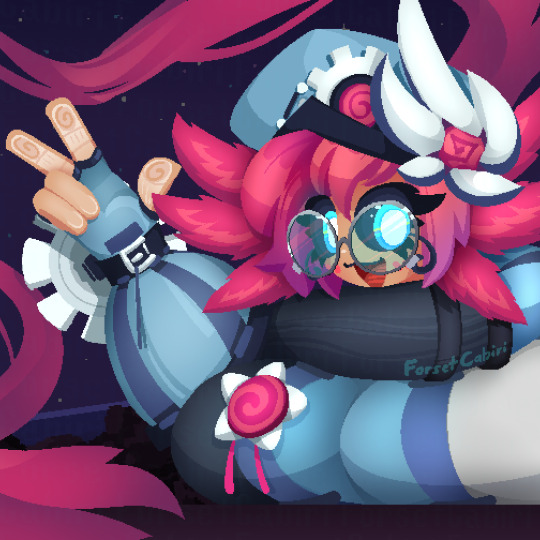
Modul is often described as the "bounciest member of the mech repair team". Can you imagine why?
#my art or whatever#oc: modul#monster girl#axolotl girl#artists on tumblr#and uhhhhhhh#suggestive#probably should be tagged that way yeah
58 notes
·
View notes
Text
Some doodles, the players met with the Red Order and their pet attack Lasombra.





#no one expects the inquisition (to ally and use supernaturals as befits their purposes 😌)#i ended up reading the dark ages inquisitor module for this and the red order are too fun not to use#“yes we hunt vampires yes we ingest vitae we exist”#oc: leo#vtm dark ages#oc: randell#vtm#oc: Emir#oc: theodosia#oc: lucretia#oc: berenice#oc: salomea
24 notes
·
View notes
Text

arknightssona redesign complete!!! could u believe they made the alchemist subclass just for the little guy i have always imagined throwing debuff bombs /silly
this is my little beast sundream, 5star alchemist specialist! its a sarkaz and rather than using its arts directly in battle it prefers to engage in chemical warfare
#not quite sure on skills yet but first skill is probably a purely big attack buff + passive arts damage skill like um#kirara s2 but much shorter cooldown. spammable#s2 is like 4 passive damage + debuff fields. maybe enemies that die there become critically wounded so they can be sp batteries#.... ok maybe 4 is a lot. like up to 3 probably#yeah. range expansion + up to 3 passive damage critically wounded fields#and then on module it gets bonus elemental damage too if i wanna go full chemical warfare#arknights#sun art#arknights sona#aksona#oc art
23 notes
·
View notes
Text
"The bard will be the front of the unicorn costume, because that's where the acting needs to be. I’ll be the back of the costume, because I know how to shake my ass."
- The party's horny rogue
#wild beyond the witchlight#this module be like that#shit my players say#dnd shenanigans#game quote#dnd quote#d&d quotes#dungeons and dragons#dnd campaign#dnd5e#dnd#d&d#d&d 5e#d&d campaign#D&D character#dnd oc#pc: tekhetsio thriyan
13 notes
·
View notes
Text
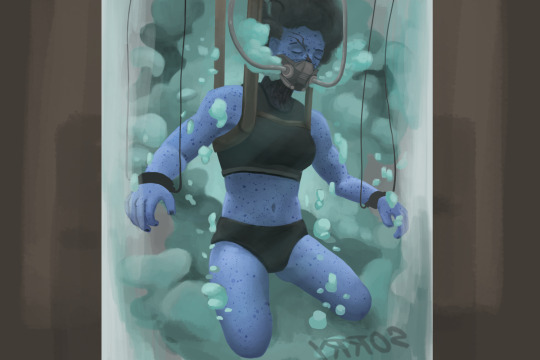
Lachen Halloween RP aftermath
Really wanted to draw her in a kolto tank, was inspired by Depa Billaba's bacta tank shots in Kanan #1.
WIP and alt w/o glass effect below!
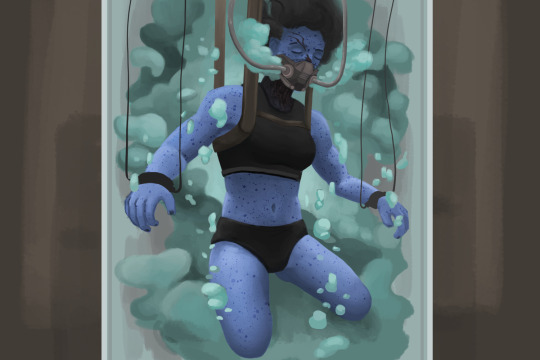
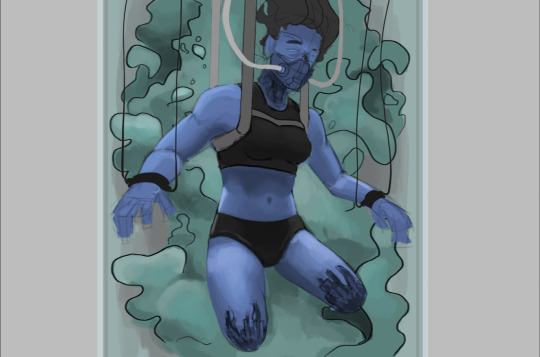
#tw amputation#tw amputee#my art#star wars#swtor#star wars the old republic#oc#lachen wren#chiss#mandalorian#digital art#hoping the legs look accurate#the bubbles were so fun to paint#the “sorry” on the tank was written by Nox (Aliit Barec's Alor (1ic)) who had to stitch her mouth shut the 2nd time#she had painkillers that time atleast#been off and on about cyberpunk augmenting her vocal chords (namely for voice modulation 24/7). its... its so tempting.............#OC creator try not to traumatize and injure your OCs: impossible challenge
21 notes
·
View notes
Text


frimotan........ frimotan...................
#art#traditional art#watercolour#fanart#vocal synth#frimotan#synthv#frimomen#?#also rosie is here because i drew her to close to my warmup line of rosies#oc#oc art#oc group: lia crystal darling#oc: rosie#i've said this before but everyone needs to be put in the colourful drop module#its so iconic for me. not even because of project diva. but because of mmd LOL#the amount of model edits with that outfit.... its truly iconic for me <3
12 notes
·
View notes
Text

COME ON YOU SON OF A BITCH
#my friends and i have been playing the in golden flame module for lancer and. hooh#we just finished the first like. story part#oh man.#oh man#anyways yeah good module i like it a lot and i like my character a lot#my art#my ocs#lancer#lancer rpg#in golden flame#in golden flame spoilers#(?)#maybe
81 notes
·
View notes
Text
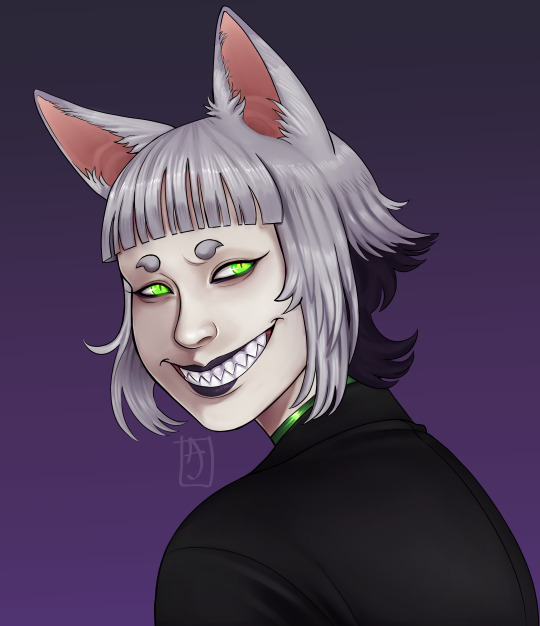
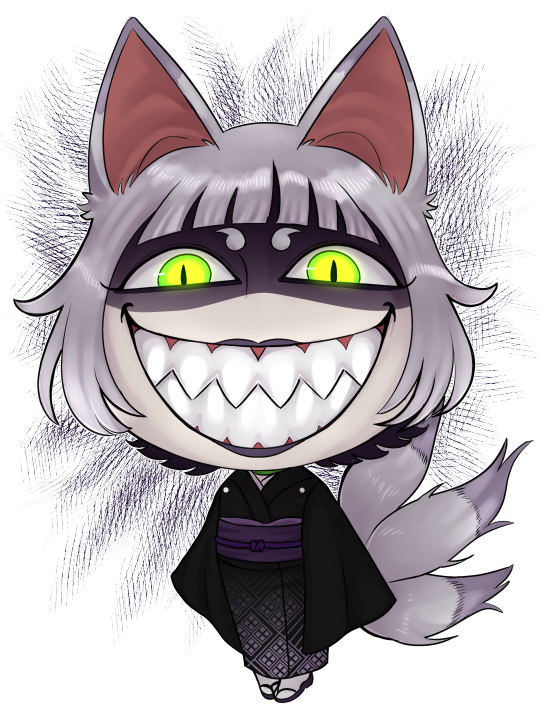
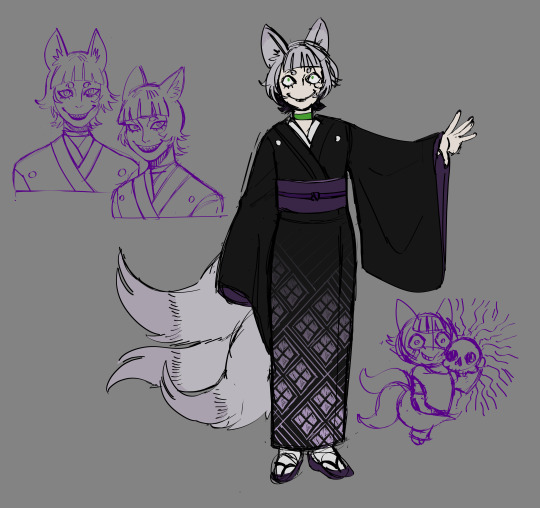
My edgy bones oracle kitsune, Miyako (they/them), for a pathfinder 2e module! (Season of Ghosts)
I had a lot of fun designing this menace even though they almost died to cave scorpion venom in my very first session playing
#Miyako#Pathfinder 2e#Pathfinder#ttrpg#ttrpg oc#kitsune#AJ Arts#I did so much research for this outfit but I still feel like I could have done better aaaa#I wanted to go for a somewhat confusing gender expression with their clothing because their gender is 'wouldn't you like to know'#I also wanted to add some death and funeral theming with their outfit hence the mofuku styled furisode and the death fold#it's a very Japanese-inspired module so I wanted to try and make sure I handled the character design respectfully#I did my best haha#I also had a lot of help from friends!
7 notes
·
View notes
Text
so on friday we had our regular kingmaker session. spent the first part of it doing kingdom management (how did we get TWO CULT INFILTRATIONS IN A ROW), claiming hexes, etc. then we took a break from playing Mathfinder to actually play Pathfinder and went back into exploration/adventure mode.
one of our villagers came to me (as the general/head of the armed militia), asking me to investigate a pair of murders that had happened—two dead, apparently mauled and partially eaten by an animal, two nights in a row.
i (as both player and character) keep obsessive track of the moon cycles in-game, because my character is a werewolf. the murders had happened on the two nights before the full moon.
me: it's another FUCKING WEREWOLF, isn't it! gm: well, you can do some investigating— me: but i don't need to because i already know it's another FUCKING WEREWOLF.
spoiler alert! it was, in fact, another FUCKING WEREWOLF.
(in-character at least two of my party members suspected i had lost control and done it, which, ouch. fair but ouch.)
anyway we caught up with the other werewolf on the night of the full moon and had an incredible werewolf v werewolf smackdown, and general nordylva asserted her territorial boundaries with incredible violence!
#journal#cyan plays ttrpgs#the BONKERS part is that the werewolf thing was pre-written into the module!#i had no idea about it when i made my character a lycanthrope to be clear#we did find out there's at least one other werewolf pack that's been in the area#and they're ustalavs so they're from the same place that nori was turned...#Hoo Boy things are gonna get Spicy#but it was such a fun session and a great character moment#oc: nordylva rook
7 notes
·
View notes
Text
pirates oc woahhhh



i have been consumed by brainrot instead of. doing my course. worth it
The left is Ben and the right and lower images are Lucia! Enjoy
#i put so much effort into that last one and then gave up on the line work. can you tell#i did it instead of my risk assessment.#if i dont have my risk assessment i cant shoot my film which means i fail the module#[ive done it now its okay]#potc#potc oc#oc art#my oc#arts#potc fanart#pirates of the caribbean#pirates of the caribbean oc#its brainrot time#currently working on the backstories :]#moss posts#pirate oc
14 notes
·
View notes
Text

look at my d&d character, boy
#stupid text posts#d&d#d&d oc#he's a red dragon who made a bet with a copper dragon and lost it#and as a result was bound into a kobold form#and he's not allowed to turn back until he makes mortal friends and you know how the story goes#anyways he nearly died in the last module we did and now he has to confront his mortality#and is finally seriously taking the idea of allying with these mortals#and treating them with respect instead of disdain#and im fucking. im just so. hrgh.
10 notes
·
View notes